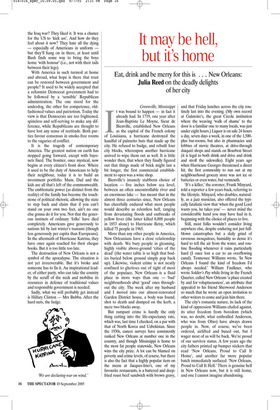It may be hell, but it’s home
Eat, drink and be merry for this is ... New Orleans: Julia Reed on the deadly delights
of her city
Greenville, Mississippi
It was bound to happen — in fact it already had. In 1719, one year after Jean-Baptiste Le Moyne, Sieur de Bienville, established New Orleans as the capital of the French colony of Louisiana, a hurricane destroyed the handful of palmetto huts that made up the city. He refused to budge, and rebuilt four city blocks, whereupon another hurricane arrived to wipe them out as well. It is little wonder then, that when they finally figured out that things made of brick might last a bit longer, the first commercial establishment to open was a wine shop.
Bienville’s insanely stubborn choice of location — five inches below sea level, between an often uncontrollable river and an enormous lake — has meant that in the almost three centuries since, New Orleans has cheerfully endured what most people would describe as relentless hell, ranging from devastating floods and outbreaks of yellow fever (the latter killed 8,000 people in 1853 alone) to Hurricane Betsy, which killed 75 people in 1965.
More than any other people in America, New Orleanians have a close relationship with death. We bury people in gleaming, highly visible above-ground ‘cities of the dead’ (the water table is so high that bodies buried below ground simply pop back up). Likewise, violent crime is not neatly confined to ghettoes out of sight of most of the populace. New Orleans is a fluid place in more ways than one — ‘bad’ neighbourhoods abut ‘good’ ones throughout the city. The week after my husband and I moved into our almost-renovated Garden District house, a body was found, shot to death and dumped on the kerb, a mere two blocks away.
But rampant crime is hardly the only thing cutting into the life-expectancy rate, which was, last time I checked, on a par with that of North Korea and Uzbekistan. Since the 1930s, cancer surveys have consistently ranked New Orleans at number one in the country, and though Mississippi is home to the most fat people statewide, New Orleans wins the city prize. A lot can be blamed on poverty and crime levels, of course, but there is also the fact that a highly popular item on the menu at Jacques-Imo’s, one of my favourite restaurants, is a battered and deepfried roast beef sandwich with brown gravy, and that Friday lunches across the city routinely last into the evening. (My own record at Galatoire’s, the great Creole institution where the weaving ‘walk of shame’ to the door is a familiar one to many locals, was just under eight hours.) Liquor is on sale 24 hours a day, seven days a week, in one of the 1,500plus bar-rooms, but also in pharmacies and lobbies of movie theatres, at drive-through daiquiri shops and stands on Bourbon Street (it is legal to both drink and drive and drink and stroll the sidewalks). Eight years ago when Hurricane Georges threatened a direct hit, the first commodity to run out at my neighbourhood grocery store was not ice or batteries or even water, but vermouth.
‘It’s a killer,’ the coroner, Frank Minyard, told a reporter a few years back, referring to the lifestyle. Minyard, who doubles, naturally, as a jazz musician, also offered the typically fatalistic view that ‘when the good Lord wants you, he takes you’ — never mind the considerable hand you may have had in it, beginning with the choice of places to live.
Still, most folks wouldn’t consider living anywhere else, despite enduring not just fullblown catastrophes but a daily grind of ravenous mosquitoes, humidity so dense it’s hard to tell the air from the water, and routine flooding whenever it rains particularly hard (I once lost a car to an overflowing canal). Tennessee Williams wrote, ‘In New Orleans I found the kind of freedom I’d always needed.’ William Faulkner, who wrote Soldier’s Pay while living in the French Quarter, called New Orleans ‘a place created by and for voluptuousness’, an attribute that appealed to his friend Sherwood Anderson so much that he wrote an open invitation to other writers to come and join him there.
The city’s romantic nature, its lack of the kind of oppression Williams chafed against, its utter freedom from boredom (which was, no doubt, what enthralled Anderson, who was from Ohio) have always drawn people in. Now, of course, we’ve been ordered, airlifted and bused out, but I wager most of us will be back. We’re proud of our survivor status. A few years ago the city fathers printed up bumper stickers that read ‘New Orleans, Proud to Call It Home’, and another far more popular batch immediately surfaced: ‘New Orleans, Proud to Call It Hell.’ There is genuine hell in New Orleans now, but it is still home, and one I cannot imagine abandoning.
























































 Previous page
Previous page